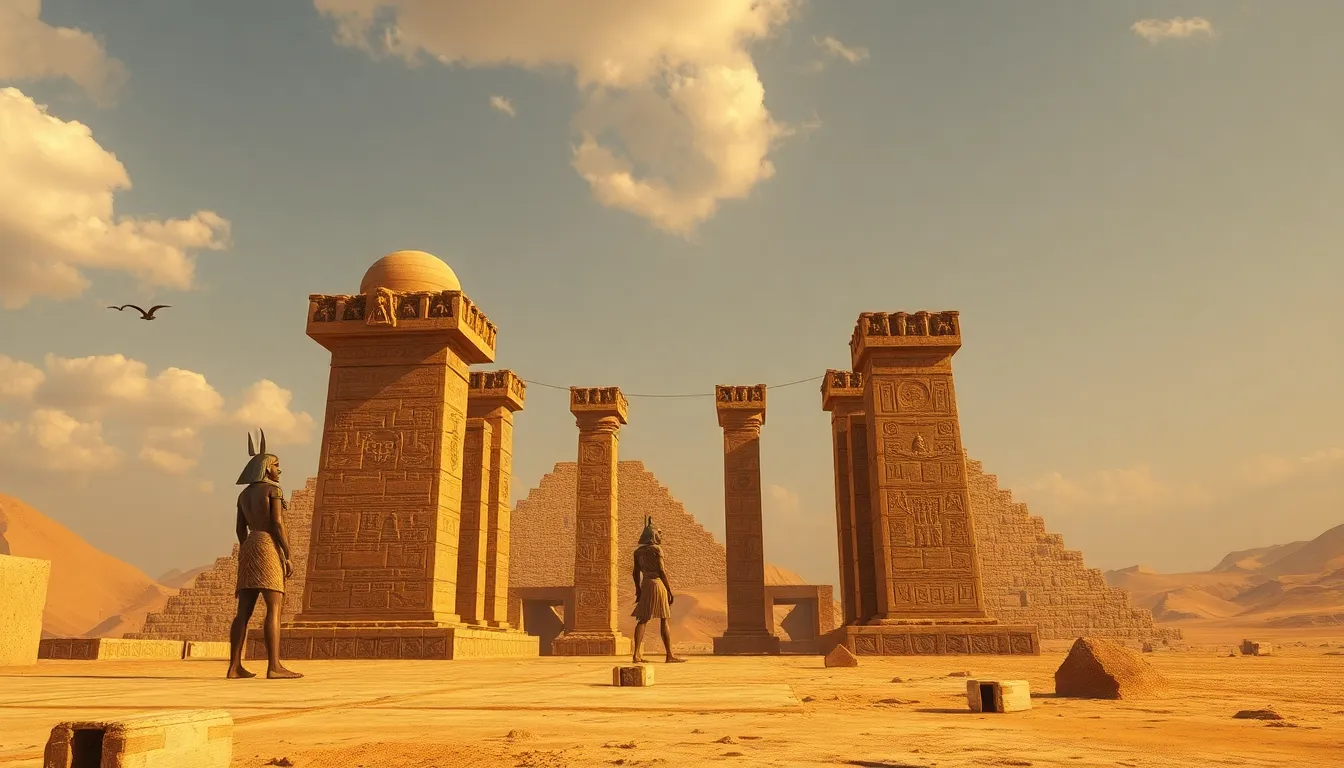The Afterlife in Ancient Egyptian Belief Systems
I. Introduction
Ancient Egyptian belief systems were deeply intertwined with their understanding of the afterlife. For the Egyptians, life did not end with death; instead, it was viewed as a transition into another realm where the soul would continue its existence. The importance of the afterlife permeated their culture, influencing everything from monumental architecture to daily practices. This article aims to explore the core beliefs surrounding the afterlife in ancient Egypt, the deities involved, significant texts, funerary practices, and the overall cultural significance of these beliefs.
II. Core Beliefs About the Afterlife
The ancient Egyptians held a complex view of the soul, which was divided into several components:
- Ka: The life force or spirit that remained with the body after death.
- Ba: The personality or essence of an individual, which could travel between the worlds of the living and the dead.
- Akh: The transformed spirit that had achieved a successful afterlife, often associated with the presence of divine light.
Upon death, the journey to the afterlife began. The deceased would navigate through various challenges, confronting guardians and obstacles that could hinder their progress. A crucial aspect of this journey was divine judgment, which involved a significant ceremony known as the weighing of the heart.
III. The Role of Osiris
Osiris, one of the most important deities in the Egyptian pantheon, was revered as the god of the afterlife. His story is a cornerstone of Egyptian mythology, embodying themes of death, resurrection, and renewal.
- Osiris as the god of the afterlife: Osiris was depicted as a mummified king, symbolizing the cycle of life and death. His role was to oversee the judgment of the deceased.
- Myths surrounding Osiris and his resurrection: Osiris was murdered by his brother Set, dismembered, and scattered. His wife, Isis, collected his body parts and resurrected him, highlighting the themes of rebirth and the eternal cycle.
- Osiris’ influence on funerary practices: His story influenced how the Egyptians approached death and burial, leading to elaborate tombs and rituals intended to ensure a safe passage to the afterlife.
IV. The Book of the Dead
The Book of the Dead is a significant funerary text containing spells, prayers, and incantations designed to assist the deceased in navigating the afterlife. This text served as a guide, aiming to ensure safe passage and favorable judgment.
- Overview of the text and its significance: The Book of the Dead was not a single book but a collection of texts that varied from one tomb to another. It was essential for the deceased’s journey.
- Key spells and their purposes: Some key spells included instructions for overcoming obstacles, protection from malevolent spirits, and securing a place in the afterlife.
- How the Book of the Dead guided the deceased: The spells were meant to empower the deceased, ensuring they could navigate the challenges posed by the afterlife and achieve a favorable outcome during judgment.
V. Funerary Practices and Burial Customs
Funerary practices in ancient Egypt were elaborate and reflected their beliefs about the afterlife. Central to these practices was the process of mummification.
- Mummification process and its importance: Mummification preserved the body for the afterlife, as the Ka was believed to need a physical form. The process involved removing internal organs, drying the body with natron, and wrapping it in linen.
- Tomb construction and burial goods: Tombs were constructed to house the deceased and were filled with goods, food, and offerings to support the individual in the afterlife. The grandeur of a tomb often reflected the individual’s social status.
- Rituals performed for the deceased: Various rituals were performed, including the Opening of the Mouth ceremony, which symbolically restored the deceased’s senses, enabling them to engage in the afterlife.
VI. The Concept of Judgment
The concept of judgment was a fundamental aspect of the afterlife in ancient Egypt. The Weighing of the Heart ceremony was a pivotal moment for the deceased.
- The Weighing of the Heart ceremony: In this ceremony, the heart of the deceased was weighed against the feather of Ma’at, the goddess of truth and justice. A balanced scale indicated a life of virtue.
- Anubis’ role in the judgment process: Anubis, the god of mummification and the afterlife, oversaw the weighing process, ensuring fair judgment of the soul.
- Consequences of judgment: the rewards and punishments: If the heart was lighter than the feather, the individual was granted access to the Field of Reeds. If heavier, they faced annihilation by the devourer, a creature that consumed unworthy souls.
VII. Afterlife Realms and Their Descriptions
The afterlife was not a monolithic concept; instead, it consisted of various realms, each with its significance.
- The Field of Reeds as the ideal afterlife: This was considered the ultimate paradise, a lush, fertile land where the deceased could live in peace and abundance.
- Other afterlife realms and their significance: Other realms included fields of punishment and places for purification, reflecting the moral complexity of Egyptian beliefs.
- Variations in beliefs among different social classes: While the elite had grand tombs and extensive funerary texts, commoners had simpler burials, highlighting the disparities in beliefs and practices based on social status.
VIII. Conclusion
In summary, the afterlife held profound significance in ancient Egyptian culture, influencing their religious beliefs, funerary practices, and societal structures. The core beliefs surrounding the soul, the pivotal role of deities like Osiris and Anubis, and the guidance provided by texts such as the Book of the Dead illustrate the complexity of their afterlife beliefs. These ancient perspectives continue to resonate in modern contexts, reflecting humanity’s timeless fascination with life, death, and what lies beyond. The significance of the afterlife in ancient Egyptian culture serves as a reminder of their enduring legacy and the universal quest for understanding the mysteries of existence.




